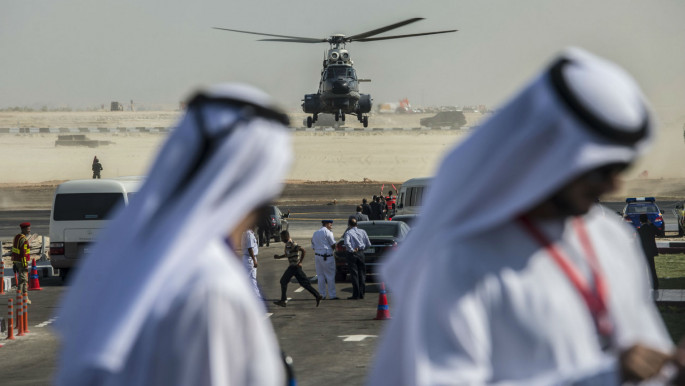Will Saudi Arabia cut aid to Egypt?
Will Saudi Arabia cut aid to Egypt?
It's unlikely that Cairo will feel the Saudi ire too strongly, but Riyadh has already scrapped a $4bn deal with Lebanon in retaliation for Beirut 'siding with Iran'.
3 min read
Egypt receives billions of dollars in aid from Gulf nations, in particular Saudi Arabia [Getty]
Prominent political analysts have weighed in on the possibility of Saudi Arabia stopping aid to Egypt because of the North African country's reservations over joining Saudi military intervention in Syria.
It remains unlikely that Saudi Arabia will end aid to Cairo, because the ramifications would be "disastrous" for Riyadh, say experts.
Saudi Arabia announced last week that it was halting deals worth $4 billion aimed at equipping and supporting Lebanese security forces, in retaliation for Beirut siding with Iran in the Sunni kingdom's spat with the Shia power.
"Saudi Arabia is awaiting a combatant position from Egypt towards heated regional issues. As an observer, I think that Saudi Arabia wants Egypt to have a bigger role because of its size and influence," veteran Saudi journalist Jamal Khashoggi told German media.
"However, Egypt has done the minimum to stay on Saudi Arabia's friends list," he said.
Khashoggi added that Saudi Arabia would not directly demand that Egypt take part in military activity and that the Lebanon's "hostile policies" were irrelevant in this case.
Last week, Egypt President Abdel Fattah al-Sisi said Egypt would send military forces to defend its Gulf Arab allies if necessary.
Egypt receives billions of dollars in aid from Gulf nations and is part of the Saudi-led military campaign in Yemen, but has so far not committed ground troops to the campaign - a move which has been severely criticised in Gulf capitals.
In January, Saudi Arabia promised to invest $8 billion in Egypt through its public and sovereign funds. It also agreed to provide $1.5 billion to help develop the Sinai peninsula, and granted $200 million of loans for small- and medium-sized enterprises.
Saudi Arabia has also recently promised Egypt about $20 billion in oil products over five years.
Saudi Arabia, along with several Gulf states, has offered to deploy ground troops in Syria to fight the Islamic state group [IS].
The New Arab's Gulf correspondent, Badr al-Rashed, said that it was unlikely that Saudi Arabia would cut aid to Egypt.
"Lebanon's regional political weight does not compare to Egypt's. Any jolt in Cairo would be disastrous for Riyadh, whereas in Lebanon avoiding an outburst seems almost impossible because of Hizballah's dominance," Rashed said.
"Riyadh considers Hizballah an Iranian militia, which has taken over the state by force. Saudi Arabia has tried to counter this with military aid but has been shocked to see Hizballah's influence just increase," he said.
Hizballah recently requested that the Arab League Council not condemn the attacks on the Saudi embassy in Tehran or its consulate in Mashhad.
"Saudi Arabia has ambitions to form a Sunni Islamic alliance, it will either fulfill this or lose everything," said Osama al-Dalil, an Egyptian political analyst.
"Egypt has always publicly stated that it is for a political solution in Syria - not a military one. This has been unwavering foreign policy towards Syria in particular."
He added that Saudi Arabia would not want to "lose influence over 90 million Egyptians, after winning it from the US", and that Egypt's war against militants in Sinai made Cairo reluctant to intervene militarily even in Libya, despite the instability there being a "dangerous burden".
Saudi scholar Abdel Aziz al-Khames agreed in a tweet: "They say that Egypt is an enemy because it has not stood beside us militarily against [Assad]. Your ally Turkey has said no to a ground deployment and is attacking the Kurds instead of [Assad], should we go to war with them?"
It remains unlikely that Saudi Arabia will end aid to Cairo, because the ramifications would be "disastrous" for Riyadh, say experts.
Saudi Arabia announced last week that it was halting deals worth $4 billion aimed at equipping and supporting Lebanese security forces, in retaliation for Beirut siding with Iran in the Sunni kingdom's spat with the Shia power.
"Saudi Arabia is awaiting a combatant position from Egypt towards heated regional issues. As an observer, I think that Saudi Arabia wants Egypt to have a bigger role because of its size and influence," veteran Saudi journalist Jamal Khashoggi told German media.
"However, Egypt has done the minimum to stay on Saudi Arabia's friends list," he said.
Khashoggi added that Saudi Arabia would not directly demand that Egypt take part in military activity and that the Lebanon's "hostile policies" were irrelevant in this case.
Last week, Egypt President Abdel Fattah al-Sisi said Egypt would send military forces to defend its Gulf Arab allies if necessary.
Egypt receives billions of dollars in aid from Gulf nations and is part of the Saudi-led military campaign in Yemen, but has so far not committed ground troops to the campaign - a move which has been severely criticised in Gulf capitals.
In January, Saudi Arabia promised to invest $8 billion in Egypt through its public and sovereign funds. It also agreed to provide $1.5 billion to help develop the Sinai peninsula, and granted $200 million of loans for small- and medium-sized enterprises.
Saudi Arabia has also recently promised Egypt about $20 billion in oil products over five years.
 |
|
| Saudi Arabia has poured tens of billions of dollars into Egypt [Getty] |
The New Arab's Gulf correspondent, Badr al-Rashed, said that it was unlikely that Saudi Arabia would cut aid to Egypt.
"Lebanon's regional political weight does not compare to Egypt's. Any jolt in Cairo would be disastrous for Riyadh, whereas in Lebanon avoiding an outburst seems almost impossible because of Hizballah's dominance," Rashed said.
"Riyadh considers Hizballah an Iranian militia, which has taken over the state by force. Saudi Arabia has tried to counter this with military aid but has been shocked to see Hizballah's influence just increase," he said.
Hizballah recently requested that the Arab League Council not condemn the attacks on the Saudi embassy in Tehran or its consulate in Mashhad.
"Saudi Arabia has ambitions to form a Sunni Islamic alliance, it will either fulfill this or lose everything," said Osama al-Dalil, an Egyptian political analyst.
"Egypt has always publicly stated that it is for a political solution in Syria - not a military one. This has been unwavering foreign policy towards Syria in particular."
He added that Saudi Arabia would not want to "lose influence over 90 million Egyptians, after winning it from the US", and that Egypt's war against militants in Sinai made Cairo reluctant to intervene militarily even in Libya, despite the instability there being a "dangerous burden".
Saudi scholar Abdel Aziz al-Khames agreed in a tweet: "They say that Egypt is an enemy because it has not stood beside us militarily against [Assad]. Your ally Turkey has said no to a ground deployment and is attacking the Kurds instead of [Assad], should we go to war with them?"

![Palestinians mourned the victims of an Israeli strike on Deir al-Balah [Getty]](/sites/default/files/styles/image_684x385/public/2024-11/GettyImages-2182362043.jpg?h=199d8c1f&itok=xSHZFbmc)


![The law could be enforced against teachers without prior notice [Getty]](/sites/default/files/styles/image_684x385/public/2178740715.jpeg?h=a5f2f23a&itok=hnqrCS4x)
 Follow the Middle East's top stories in English at The New Arab on Google News
Follow the Middle East's top stories in English at The New Arab on Google News


